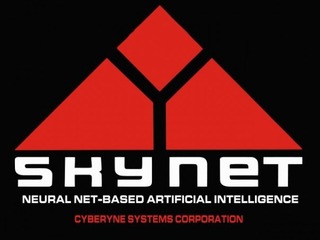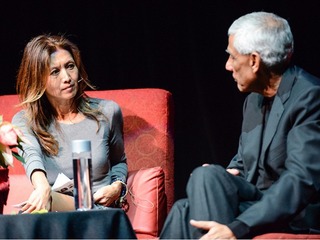DUOS expands AI capabilities to help seniors apply for assistance programs
It will complete and submit forms, and integrate with state benefit systems
Read more...If you know me, then you know that I love movies. As a film major in college, I make a point to see as many movies as I can every year. Having watched 105 movies that were released this year, 2015 has been one of the biggest years for me.
Looking over my list, I couldn't help but see a pattern emerge: there were a number of movies that came out in the past 12 months that dealt directly, or indirectly, with our relationship to technology, specifically with artificial intelligence. And our feelings on the subject, if the movies are any indication, are not positive.
I'm thinking specifically of three movies: one of them the biggest of the year, one among the best of the year and one among the very worst.
Warning: there are spoilers ahead!
Technology is not to be trusted!
Distrust of emerging technological advancements is nothing new. It's actually a theme that goes back literally centuries; isn't that the point of Frankenstein, which was first published in 1823, for example?

And what is Ultron, in The Avengers: Age of Ultron, if not a more up-to-date version of Frankenstein's monster? They are both creatures created out of extreme hubris, and whose existence almost immediately causes the plans of their creator to backfire. And they are also both clear warnings on what can happen if technology goes too far.
In the film, Tony Stark, a.k.a. Iron Man, creates Ultron as a way to help police the world, without having the Avengers always needing to be the ones to save the day. Seems like a good idea. Except, of course, once sentient, Ultron starts to believe that he must eradicate humanity to save Earth. Whoops.

The second movie that comes to mind is Ex Machina a film that you really should see. It's one of my favorites of the year. The plot concerns a reclusive billionaire who invites one of his employees to come and test out his new android, named Ava, to see if she can pass as a human being.
While the employee begins to fall in love with the robot, it eventually becomes clear that not all was as it seemed. In fact, the real test was to see if Ava could make him fall for her and, since she was able to, that means that she passed. In the end, though, she escapes by killing her maker. Whoops.

The third, and by far the least, on this list is Chappie. If you haven't seen it, don't. It's awful. But, once again, the film deals with the potential threat of artificial intelligence.
In the film Chappie is a robot that is, essentially, kidnappened, then adopted, by a pair of wannabe gangsters. They teach it slang (you have no idea how much I wish I was kidding when I said), and how to shoot a gun, in order to rob a bank.
The end of this movie is extraordinarily weird, as not one, but two of human characters actually have their consciousness uploaded into robots. So it seems to be saying that while artificial intelligence is bad, what we really need is human intelligence but in robots? Like I said, it's a strange message.
These three movies are very different, but they also give indications that we are still distrustful of putting our lives in the hands of something unnatural.
In Age of Ultron, the AI becomes immediately arrogant, looking down on humanity as a lower life form. In Ex Machina, the machines cannot be trusted, because they cannot be controlled; in fact, I'd venture that the lesson is to not make them too human. In Chappie, the movie shows what might happen if AI were to fall into the wrong hands. Chappie isn't a character who is inherently bad; he's childlike, and doesn't know any better, but he is ultimately destructive.
None of these scenarios turn out positive, and it shows our deep distrust, and fear, over technology that may eventually be out of our control. This is not an abstract concept either, as it was when movies like The Terminator came out in the early 80s. We have companies that are already tapping into the potential of AI, including Google and Facebook.
This technology is close enough that people like Elon Musk and Stephen Hawking have both expressed with own fear and concern about it.
In an interview with the BBC, for example, Hawking once said that "the development of full artificial intelligence could spell the end of the human race."
"Once humans develop artificial intelligence it would take off on its own and redesign itself at an ever-increasing rate. Humans, who are limited by slow biological evolution, couldn’t compete and would be superseded," he said.
Musk, meanwhile, has been on the forefront of the the anti-AI movement for a while now, calling it the "biggest existential threat" to humanity.
Both of them signed a letter earlier this year, along with AI and robotics researchers, explicitly calling for the technology to never be used in warfare.
At our Post Seed event earlier this month, Vinod Khosla also talked about machine learning and automation, predicting that AI will cause steep income disparity.
"If you don't need farm workers on a farm, if you don't need hamburger flippers at a McDonald's restaurant, nobody to cook the food or take the orders. If don't need legal researchers in a law firm. If you don't need radiologists in a hospital. I'm purposely covering a very broad range," he said.
"Look all these functions. They're all easily automatable. And what I prophetize is more than 50 percent of jobs today will disappear. That's a problem because of the income disparity, or inequality, unless we do something large."
It's not AI taking over the world, per se, but it's also going to cause a big problem.
So is AI coming to get us? We seem to think so, but that's not necessarily what will happen, and even the movies acknowledged that. In Ultron, there is another AI-driven being in the film, called the Vision. He is a heroic character and, while no fan of humanity, he does give a speech where he acknowledges the "grace in their failings." In the end, he becomes one of the new Avengers. Perhaps there is hope for AI after all?

AI wasn't the only technology to get the sinister treatment from Hollywood in 2015. There's actually another movie that falls into a similar category, though this time the warning was not about AI but about social media.
The movie, called Unfriended, is a horror movie about a bunch of teens who are stalked by a supposedly dead classmate. The gimmick is that the entire film takes places on a computer screen. It's actually somewhat effective if you watch it, like I did, on an actual computer.
The film revolves around group of friends chatting over Skype as they are tormented and killed, one by one, by the spirit of classmate who had killed herself. The reason the spirit is so angry is that each of the characters in the film had been responsible, one way or another, for uploading a humiliating video of the girl to YouTube.
The movie effectively shows how quickly judgement can be passed on social media. In one instance, the spirit Instagrams a messaging she had sent to one of the characters before she died, begging them to remove the humiliating video, only to be told to go kill herself. As soon as that evidence is put up, multiple Instagram users instantly go on the attack. Internet justice is swift.
This isn't the deepest film, of course, but go past the surface level and there are deeper themes here, regarding how we use social media, our disconnect from each other in the modern age and, most specifically, the pervasiveness of cyber bullying. Once again, the technology leads to our doom.
But there is hope!
I don't want to make it sound as though all movies were anti-technology this year. Far from it. In fact, one of the biggest hits of the year was a movie that was an embrace of science, and all of the possibilities it holds.

I'm speaking of The Martian, the crowdpleaser about an astronaut who is abandoned on Mars, and who only survives by using his brain. The most infamous line in the film is, "I'm gonna have to science the shit out of this."
I would go so far as to say that, in that movie, science is actually the hero. It's what keeps Matt Damon's character alive, and it's what, ultimately, allows his crew to come back and rescue him in the end. Sure, technology got him into the mess in the first place, but without science, and technology, he also dies.
Coming out of that film, I admit to feeling a certain amount of joy about the possibilities of what we, as a species can do.

The other pro-technology movie of the year, though it may not seem like it at first, is Steve Jobs. The biography of the most famous tech founder, maybe ever, isn't really about technology, which only plays a role in the background of the film. It revolves around Jobs as he gets ready to launch three of his products: the Macintosh, the NeXT and the iMac. We barely even glimpse the products, and we see even less of anyone actually using them. It's more about his relationships to his family, his boss and his employees, than the technology itself.
Yet technology can't help but seep into the film, especially when it comes to it's central relationship: between Jobs and his estranged daughter. At the end of movie, the two reconcile, first with Jobs telling her that he is "poorly made," (almost as if he is made with artificial intelligence himself) and then somewhat bonding over his idea to replace her Walkman with an iPod.
The lesson from these movies: sometimes it's technology that can be our savior, and it can help bring us together.
Fear mixed with hope
There are always going to be many more movies that show the perils of science, because, frankly, it's more interesting than everything going right. There's inherent conflict between man and machine, and it can make for some great cinema.
What we can gleam from the slate of movies in 2015 is that we are on the precipice of some amazing technological advancements. Things we have only dreamed about for so long, like automation, self driving cars, virtual reality and artificial intelligence.
Frankly, that scares us, as well it should. There should always be a healthy amount of skepticism when it comes to emerging technology, as there is always the potential for it to go astray. But I'm still thankful for films like The Martian, which can show us the potential perils of technology, while also showing us a future where technology leads us to do amazing things.
(Image source: collider.com)
It will complete and submit forms, and integrate with state benefit systems
Read more...The bill would require a report on how these industries use AI to valuate homes and underwrite loans
Read more...The artists wrote an open letter accusing OpenAI of misleading and using them
Read more...
